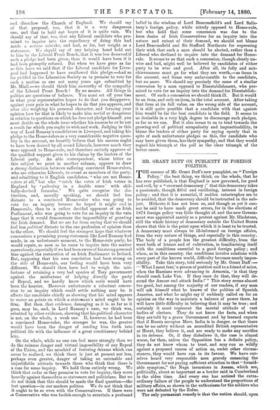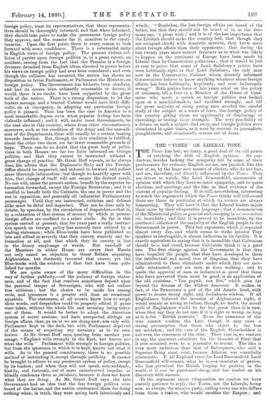MR. GRANT DUFF ON PUBLICITY IN FOREIGN POLITICS.
THE essence of Mr. Grant Duff's new pamphlet, on "Foreign Policy," the best thing, we think, on the whole, that he has ever published, is that England is now governed, for good and evil, by a " crowned democracy ;" that this democracy takes a passionate, though fitful and vacillating, interest in foreign policy ; and that it is essential, if sudden catastrophes are to be avoided, that the democracy should be instructed in the sub- ject. Hitherto it has not been so, and though as yet it can- not be said to have made great errors, for in the elections of 1874 foreign policy was little thought of, and the new Govern- ment was appointed mainly as a protest against Mr. Gladstone, still the whole history of democracy outside the United States shows that this is the point upon which it is least to be trusted. A democracy must always be ill-informed on foreign affairs, from the very nature of things, and especially in this country. The body of a people has the greatest difficulty, from the want both of leisure and of cultivation, in familiarising itself with the conditions essential to a good foreign policy ; and when, as in this country, the conditions involve relations with every part of the known world, difficulty becomes nearly impos- sibility. Take this story, told seriously by Mr. Grant Duff :- "' What I most fear,' a person of position said to a friend of mine, when the Russians were advancing in Armenia, is that they should reach Lake Van. If they once do that, they will de- scend the Amoor and attack India!' " This story seems almost too good, but among the majority of our readers, if any man will ask himself what he knows of the politics of Spanish America, and what he might say if suddenly called on for an opinion on the way to maintain a balance of power there, he will have little difficulty in believing that it may be true ; and certainly it must represent the mental attitude of vast bodies of electors. They do not know the facts, and when they are told by a grave Government and by learned experts that if Russia occupies Merv, India is in danger, or that there can be no safety without an accredited British representative at Herat, they believe it, and are ready to make any sacrifice in its defence. Or, if they disbelieve it, the case is almost worse, for then, unless the Opposition has a definite policy, they do not know whom to trust, and may run as wildly against a proposed course of action as, under other circum- stances, they would have run in its favour. We have our- selves heard very responsible men gravely censuring the Government for not paying sufficient attention to that "formid- able symptom," the Naga incursions in Assam, which are, politically, about as important as a border raid in Cumberland in the olden time. And every one has noticed the extra- ordinary failure of the people to understand the proportions of military affairs, as shown in the enthusiasm for the soldiers who were not defeated by the Zulus. The only permanent remedy is that the nation should, upon foreign policy, trust its representatives, that those representa- tives should be thoroughly informed, and that when informed, they should take pains to make the permanent foreign policy they approve, and the reasons for it, manifest to the consti- tuencies. Upon the first point, there is every reason to look forward with some confidence. There is a substantial unity in English views of foreign policy. The present violent col- lision of parties upon foreign politics is, to a great extent, an accident, arising from the fact that the Premier is a foreign dreamer, detached from English ideas, elevated to power before his views on foreign policy had ever been considered ; and even though the collision has occurred, the nation has shown no disposition to fetter Parliament, or Parliament the Ministry, on foreign policy. The Government has hitherto been absolute, and had its course been ordinarily reasonable or decent, it would, there is no doubt, have been supported by the great bulk of the nation. There is a strong disposition to let the leaders manage, and a trusted Cabinet would ha■m little diffi- culty, on an emergency, in adopting any particular foreign policy it pleased. That has been the case in America to a most remarkable degree, even when popular feeling has been violently inflamed ; and it will, under most Governments, be the case also in this country, where from other circumstances, moreover, such as the condition of the Army and the unreadi- ness of the Departments, there will usually be a certain leaning towards inaction. But, though the first condition is fulfilled, about the other two there are far fewer reasonable grounds of hope. There can be no doubt that the great body of politi- cians in both Houses are far too little informed on foreign politics, and that they cannot be instructed without a great change of practice. Mr. Grant Duff repeats, as he always does, his advice that the Diplomatic Body and the Foreign Office should be improved, and induced to forward and collect more thorough information ; but though we heartily agree with him, that change of itself will not secure the desired result. No one will, under the present system, benefit by the superior in- formation forwarded, except the Foreign Secretaries ; and it is needful to benefit both the Cabinets, the one in power and the one in opposition, and generally all influential Parliamentary personages. Until they are instructed, criticism and defence alike must be fitful and imperfect. This can be done only by debate, by speeches, by the circulation of despatches,—that is, by a relaxation of that system of secrecy by which at present foreign affairs are confined to a select circle. So far is this system carried at present, that for years past a really instruc- tive speech on foreign policy has scarcely been uttered by a leading statesman ; while Blue-books have been published so late and edited so severely that they convey scarcely any in- formation at all, and that which they do convey is lost
in the dreary surplusage of words. Not one-half of the Members in either House are aware that Russia not only raised no objection to Great Britain acquiring Afghanistan, but distinctly favoured that course, yet the Blue-books with the evidence of that fact have been pub- lished for months.
We are quite aware of the many difficulties in the way of further publicity,—of the jealousy of foreign states- men, and of the fact that resolves sometimes depend upon the personal temper of Sovereigns, who will not endure free criticism ; but the choice to be made lies among evils, and ignorance is a greater evil than an occasional squabble. The statesmen, at all events, know how to weigh their words, and despatches could be properly edited, if pains were taken, without the whole life and meaning being taken out of them. It would be better to adopt the American system of secret sessions, and have unreported sittings on foreign affairs, than go on as we are doing now, nob only with Parliament kept in the dark, but with Parliament depriied of the means of acquiring any certainty as to its own desires. As Mr. Grant Duff says, quoting from another per- sonage, " England wills strongly in the East, but knows not what she wills." Parliament wills strongly in foreign politics, but from the ignorance in which it is kept, knows not what it wills. As to the general constituency, there is no possible method of instructing it, except through publicity. It cannot be brought to adhere to any persistent system of policy, except by its leaders ; and when they will not speak, acts suddenly, hastily, and furiously, out of mere uninstructed impulse, or blindly condemns them as faineants, because it does not know what they are doing. As Mr. Grant Duff says, the late Government had an idea that the less foreign politics were heard of the better, and the nation condemned them for doing nothing when, in truth, they were acting both laboriously and
wisely. " Doubtless, the less foreign affairs are heard of the better, but that they should not be heard of is, as the Ger- mans say, a pious wish ;' and it is of the last importance that the Liberals should make the country feel, that though they are occupied chiefly with domestic matters, they know more about foreign affairs than their opponents ; that during the last twenty years more correct forecasts as to what was likely to happen on the continent of Europe have been made by Liberal than by Conservative politicians ' • that it would be just as easy to prove that some of Lord Salisbury's critics have been habitually right as that Lord Salisbury, the only man now in the Conservative Cabinet whom decently informed Conservatives believe to know anything whatever about foreign affairs, has been habitually, hopelessly, and even ludicrously wrong." Both parties have of late years acted on the policy of reticence, till a Peer or a Member of the Muse of Com- mons who made a speech on foreign politics was looked upon as a mischief-maker, and snubbed strongly, and till the great majority of rising young men avoided the careful study of the subject as a waste of force, the foreign policy of the country giving them no opportunity of displaying, or exercising, or testing their strength. The very possibility of a debate on such a subject died away, and foreign politics were abandoned in quiet times, as it were by consent, to journalists, pamphleteers, and occasionally orators out of doors.



































 Previous page
Previous page